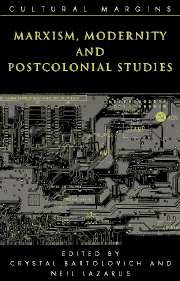Book contents
- Frontmatter
- Contents
- 1 Introduction: Marxism, modernity and postcolonial studies
- Part I Eurocentrism, “the West,” and the world
- Part II Locating modernity
- 6 Misplaced ideas? Locating and dislocating Ireland in colonial and postcolonial studies
- 7 Liberation theory: variations on themes of Marxism and modernity
- 8 Sex, space and modernity in the work of Rashid Jahan, “Angareywali”
- 9 Was there a time before race? Capitalist modernity and the origins of racism
- Part III Marxism, postcolonial studies, and “theory”
- References
- Index
7 - Liberation theory: variations on themes of Marxism and modernity
Published online by Cambridge University Press: 22 September 2009
- Frontmatter
- Contents
- 1 Introduction: Marxism, modernity and postcolonial studies
- Part I Eurocentrism, “the West,” and the world
- Part II Locating modernity
- 6 Misplaced ideas? Locating and dislocating Ireland in colonial and postcolonial studies
- 7 Liberation theory: variations on themes of Marxism and modernity
- 8 Sex, space and modernity in the work of Rashid Jahan, “Angareywali”
- 9 Was there a time before race? Capitalist modernity and the origins of racism
- Part III Marxism, postcolonial studies, and “theory”
- References
- Index
Summary
It must initially appear improbable that disciplinary fields constituted around critiques of capitalism and colonialism have given a meager reception to liberation theory. I will return to a tendency among postcolonial critics to disown liberation discourses and practices, and indeed all forms of anticolonialist rhetoric and organization. But first I want to consider why so few of the major Marxist metatheorists in Europe undertook to examine the roads taken by Marxism on colonial terrains. Even if we allow that analyses inspired by Leninist strategies for class and anti-imperialist struggles diverged from the epistemological and aesthetic concerns of Marxisms in the advanced capitalist countries, this indifference takes its place within the wider and longstanding exclusion of non-western knowledge from the canons compiled by metropolitan scholars. In a wide-ranging and provocative essay Göran Therborn acknowledges that Marxism became “the main intellectual culture of two major movements of the dialectics of modernity: the labour movement and the anti-colonial movement” (1996: 74). Yet when considering “Marxism in the New Worlds,” he underestimates the creativity and innovations of Latin American and Asian Marxisms, makes remarkably flimsy allusions to its Chinese form, and joins a larger constituency in rejecting Africa as a player in the discourses of Marxism and modernity. Thus while singling out the Martinican Fanon for his capturing of the violent traumata of modernity in the colonial zone, he goes on to assert that most important Marxist intellectuals of Africa tend to be non-black:
Black African culture very different from the Marxist dialectic of modernity, has not (yet) been able to sustain any significant Marxist intelligentsia. (78)
- Type
- Chapter
- Information
- Marxism, Modernity and Postcolonial Studies , pp. 125 - 149Publisher: Cambridge University PressPrint publication year: 2002
- 6
- Cited by

